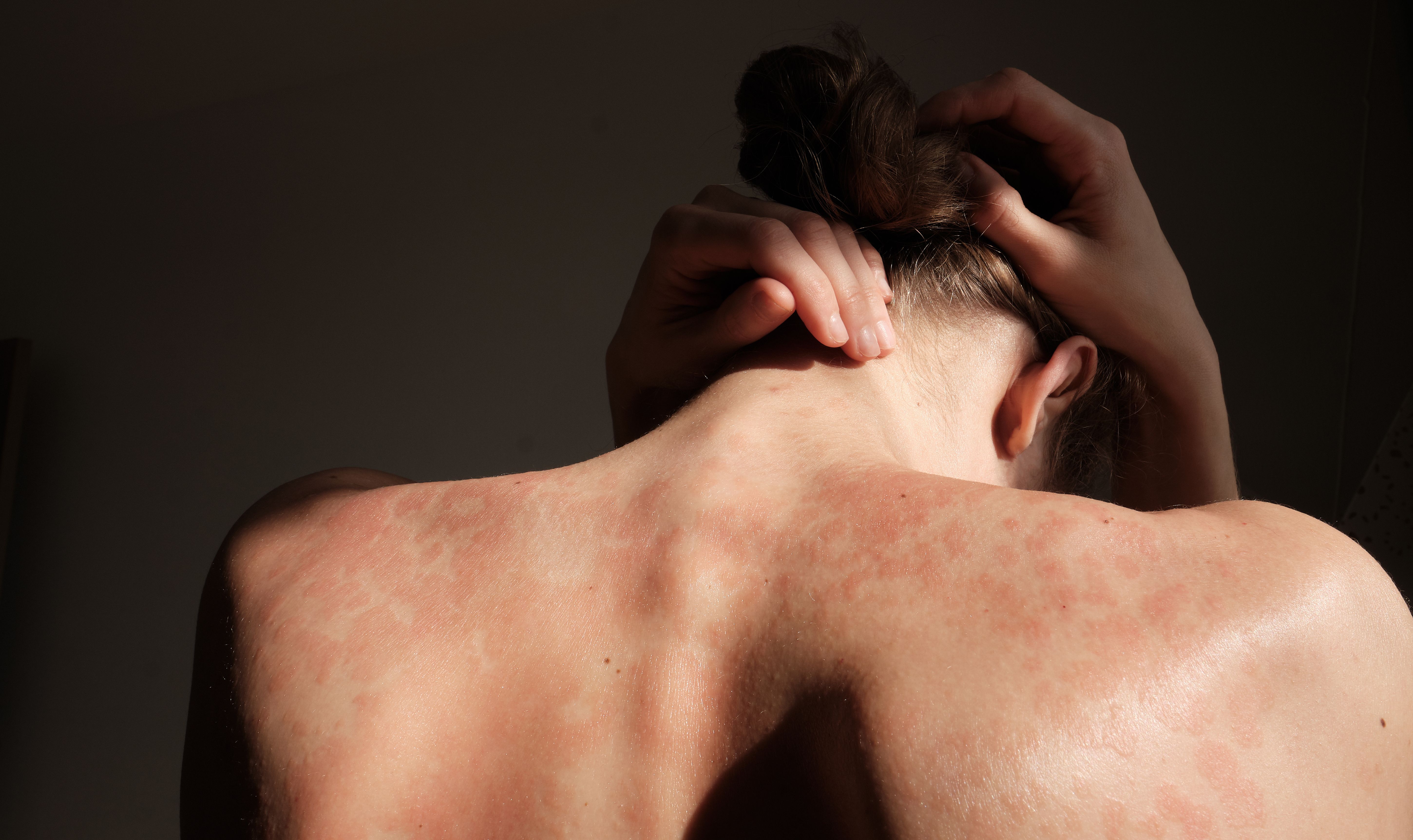- Case-Based Roundtable
- General Dermatology
- Eczema
- Chronic Hand Eczema
- Alopecia
- Aesthetics
- Vitiligo
- COVID-19
- Actinic Keratosis
- Precision Medicine and Biologics
- Rare Disease
- Wound Care
- Rosacea
- Psoriasis
- Psoriatic Arthritis
- Atopic Dermatitis
- Melasma
- NP and PA
- Skin Cancer
- Hidradenitis Suppurativa
- Drug Watch
- Pigmentary Disorders
- Acne
- Pediatric Dermatology
- Practice Management
- Prurigo Nodularis
- Buy-and-Bill
News
Article
Guselkumab Demonstrates Significant Improvement in Psoriasis Symptoms and HRQoL, Reduces Sexual Impairment and Stigmatization
Author(s):
Data stems from week 28 results of the German G-EPOSS study evaluating the effectiveness of guselkumab in skin health, quality of life, sexuality, and stigmatization.
Guselkumab demonstrates significant improvements in psoriasis symptoms and health-related quality of life (HRQoL), according to week 28 results of the German G-EPOSS study published in the Journal of the European Academy of Dermatology and Venereology. The study also found that guselkumab reduced sexual impairment and perceived stigmatization in participants.1
Researchers Gerdes et al sought to evaluate the efficacy and safety of guselkumab, particularly in the above disease-specific and social domains. It is well-documented that the burden of psoriasis extends beyond physical symptoms, significantly impacting patients' quality of life, leading to psychological distress and social stigma.2
Furthermore, sexual impairment and stigmatization are significant yet often overlooked dimensions of psoriasis-related morbidity. Patients with psoriasis, especially those with genital involvement, are at increased risk of sexual dysfunction and stigmatization.3 In fact, the World Health Organization lists sexual impairment and perceived stigmatization as key components of its comprehensive psoriasis action plan.4
"Stigmatization affects 73%–99% of patients with psoriasis and can result in social exclusion, depression, fear of loss of employment and embarrassment, and can impact on relationships/family planning," according to the study's authors.
Researchers conducted the G-EPOSS study, a prospective, non-interventional, multicenter study. Patients with moderate-to-severe plaque psoriasis were enrolled in the study between October 2019 and August 2021 across 44 study sites in Germany.
Participants were required to be 18 years of age and older with a plaque psoriasis diagnosis of moderate-to-severe nature as determined by a baseline Psoriasis Area and Severity Index (PASI) score of greater than 3 and were candidates for systemic therapy. Prospective patients were also required to be candidates for systemic therapy. Apart from biologic therapies, any individuals taking concomitant medications for their psoriasis were permitted to maintain usage of these medications.
All patients received 100 mg of guselkumab at weeks 0, 4, and every 8 weeks afterwards through a total duration of 76 weeks.
In total, 304 patients were part of the safety analysis, having received at least one dose of guselkumab, with 293 included in the evaluable set population. Patients were excluded from the evaluable set population if they lacked post-baseline PASI measurements or deviated significantly from the observational plan. Data was available for different time points: 282 patients at week 12, 252 at week 20, and 265 at week 28. Patient withdrawals before week 28 were minimal, with 6 (2.0%) attributed to adverse events.
Baseline characteristics, such as age, gender distribution, weight, BMI, and disease duration, were recorded. Prior treatment history indicated that a significant proportion of patients had received systemic (58.0%) or biologic (25.9%) therapy before participating in the study.
The study demonstrated significant improvements in psoriasis severity and related symptoms with guselkumab treatment. A substantial percentage of patients achieved primary endpoints of PASI ≤ 3 (83.0%), PASI ≤ 1 (56.2%), and PASI = 0 (35.1%) by week 28. Nail disease and anogenital psoriasis also showed considerable improvements.
Patient-reported outcomes, particularly Dermatology Life Quality Index (DLQI) and Relationship and Sexuality Scale (RSS), indicated enhanced quality of life and sexual satisfaction. DLQI scores improved, with a majority achieving DLQI 0–1 at W28. RSS responses showed decreased sexual impairment and fear of sexual intercourse, with an increase in satisfaction with sexual frequency.
Perceived stigmatization, as assessed by the Perceived Stigmatization Questionnaire, decreased over time, indicating reduced social discomfort associated with psoriasis.
Safety outcomes showed that adverse events were generally mild, with infections, skin disorders, and musculoskeletal issues being the most common. Drug-related adverse events were infrequent, with no drug-related serious adverse events or withdrawals due to such events.
"The PRO results demonstrate the clinical relevance of Q9 of the commonly used DLQI as a sentinel to trigger further investigations into sexual difficulties or anogenital skin involvement," wrote Gerdes et al. "Such a holistic approach to patient care may not only positively impact the patient's sense of self-esteem but also the patient's overall degree of social engagement and participation. Further results from the final W76 analysis of G-EPOSS will follow and provide further insights."
References
- Gerdes S, Ostendorf R, Süß A, et al. Effectiveness, safety and impact of guselkumab on sexuality and perceived stigmatization in patients with psoriasis in routine clinical practice: Week 28 results from the prospective German multicentre G-EPOSS study. J Eur Acad Dermatol Venereol. April 11, 2024. Accessed April 17, 2024. doi:10.1111/jdv.19927
- Kimball AB, Gieler U, Linder D, Sampogna F, Warren RB, Augustin M. Psoriasis: is the impairment to a patient's life cumulative? J Eur Acad Dermatol Venereol. 2010. Accessed April 17, 2024.
- Molina-Leyva A, Almodovar-Real A, Carrascosa JC, Molina-Leyva I, Naranjo-Sintes R, Jimenez-Moleon JJ. Distribution pattern of psoriasis, anxiety and depression as possible causes of sexual dysfunction in patients with moderate to severe psoriasis. An Bras Dermatol. 2015. Accessed April 17, 2024.
- World Health Assembly. Sixty-seventh World Health Assembly WHA67.9: psoriasis. 2014. Accessed April 17, 2024. https://apps.who.int/gb/ebwha/pdf_files/WHA67/A67_R9-en.pdf.






